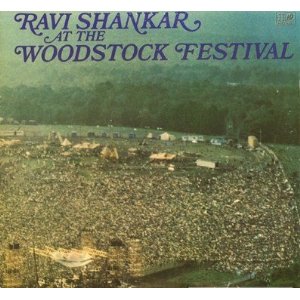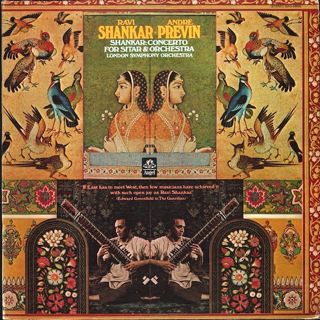
Ravi Shankar, whose name is often preceded by the title Pandit (scholar), was an Indian sitarist and composer. A sitar virtuoso, he became the world's best-known exponent of North Indian classical music in the second half of the 20th century, and influenced many musicians in India and throughout the world. Shankar was awarded India's highest civilian honour, the Bharat Ratna, in 1999.

Raga rock is rock or pop music with a pronounced Indian influence, either in its construction, its timbre, or its use of Indian musical instruments, such as the sitar and tabla. In addition, rock music from the 1960s and 1970s that incorporates South Asian musical influences and instruments, along with Western ideas of the Indian subcontinent, is often regarded as raga rock.

Raga is a 1971 documentary film about the life and music of Indian sitarist Ravi Shankar, produced and directed by Howard Worth. It includes scenes featuring Western musicians Yehudi Menuhin and George Harrison, as well as footage of Shankar returning to Maihar in central India, where as a young man he trained under the mentorship of Allauddin Khan. The film also features a portion of Shankar and tabla player Alla Rakha's acclaimed performance at the 1967 Monterey Pop Festival.
John Barham is an English classical pianist, composer, arranger, producer and educator. He is best known for his orchestration of George Harrison albums such as All Things Must Pass (1970) and for his association with Indian sitar maestro Ravi Shankar. Barham trained at the Royal College of Music and the School of Oriental and African Studies in London, before establishing himself during the mid 1960s as a composer of piano interpretations of Indian classical ragas. He became a student of Shankar, for whose East–West collaborations with Yehudi Menuhin and others he transcribed Indian melodies into Western musical annotation. Through Shankar, Barham began a long friendship with Harrison in 1966, then a member of the Beatles, which assisted Harrison's own education in Indian music as well as his promotion of the genre to Western audiences. Barham collaborated with Harrison on the latter's Wonderwall Music soundtrack album (1968), before providing the orchestral arrangements for All Things Must Pass songs such as "Isn't It a Pity" and "My Sweet Lord", and for Harrison's 1973 album Living in the Material World.
Ravi Shankar had numerous solo recordings published, including these:

At the Woodstock Festival is a live album by Indian classical musician Ravi Shankar that was released in 1970 on World Pacific Records. It was recorded on 15 August 1969, during the first day of the Woodstock Festival in upstate New York. Shankar's set took place during a downpour and he later expressed his dissatisfaction with the event due to the prevalence of drugs among the crowd.

Ravi Shankar's Music Festival from India was an Indian classical music revue led by sitarist and composer Ravi Shankar intended for Western concert audiences and performed in 1974. Its presentation was the first project undertaken by the Material World Charitable Foundation, set up the previous year by ex-Beatle George Harrison. Long a champion of Indian music, Harrison also produced an eponymous studio album by the Music Festival orchestra, which was released in 1976 on his Dark Horse record label. Both the CD format of the Ravi Shankar's Music Festival from India album and a DVD of their performance at the Royal Albert Hall in London were issued for the first time on the 2010 Shankar–Harrison box set Collaborations.

In Concert 1972 is a double live album by sitar virtuoso Ravi Shankar and sarodya Ali Akbar Khan, released in 1973 on Apple Records. It was recorded at the Philharmonic Hall, New York City, in October 1972, and is a noted example of the two Hindustani classical musicians' celebrated jugalbandi (duet) style of playing. With accompaniment from tabla player Alla Rakha, the performance reflects the two artists' sorrow at the recent death of their revered guru, and Khan's father, Allauddin Khan. The latter was responsible for many innovations in Indian music during the twentieth century, including the call-and-response dialogue that musicians such as Shankar, Khan and Rakha popularised among Western audiences in the 1960s.

Joi Bangla is an EP by Indian sitar virtuoso Ravi Shankar, issued in August 1971 on Apple Records. The recording was produced by George Harrison and its release marked the first in a series of occasional collaborations between the two musicians that lasted until the Chants of India album in 1997. Shankar recorded the EP in Los Angeles, to help raise international awareness of the plight faced by refugees of the Bangladesh Liberation War, in advance of his and Harrison's Concert for Bangladesh shows at Madison Square Garden, New York. Side one of the disc consists of two vocal compositions sung in Bengali, of which the title track was a message of unity to the newly independent nation, formerly known as East Pakistan. The third selection is a duet by Shankar and sarodya Ali Akbar Khan, supported by Alla Rakha on tabla, a performance that presaged their opening set at the Concert for Bangladesh.

Music of India: Morning and Evening Ragas is the debut album by Indian sarod master Ali Akbar Khan, released in 1955. Issued on Angel Records, it is considered a landmark recording, being the first album of Indian classical music ever released.

West Meets East, Volume 2 is an album by American violinist Yehudi Menuhin and Indian sitar virtuoso Ravi Shankar, released in 1968. It is the second album in a trilogy of collaborations between the two artists, after the Grammy Award-winning West Meets East (1967).
Kamala Chakravarty is an Indian classical musician and former dancer, known for her association with sitar maestro Ravi Shankar. From 1967 until the late 1970s, she accompanied Shankar, in the role of tambura player and singer, in a number of acclaimed performances, including the Monterey International Pop Festival (1967), his Human Rights Day duet with violinist Yehudi Menuhin (1967), the Concert for Bangladesh (1971) and the Music Festival from India (1974). She also lived with Shankar as his wife from 1967 to 1981, during which he was still married to musician and teacher Annapurna Devi.
The Asian Music Circle was an organisation founded in London, England, in 1946, that promoted Indian and other Asian styles of music, dance and culture in the West. The AMC is credited with having facilitated the assimilation of the Indian subcontinent's artistic traditions into mainstream British culture. Founded by Indian writer and former political activist Ayana Angadi and his English wife, Patricia Fell-Clarke, a painter and later a novelist, the organisation was run from their family home in the north London suburb of Finchley.

Tana Mana is an album by Indian musician Ravi Shankar, originally credited to "the Ravi Shankar Project" and released in 1987. The album is an experimental work by Shankar, mixing traditional instrumentation with 1980s electronic music and sampling technology. Shankar recorded much of Tana Mana in 1983 with sound effects innovator Frank Serafine, but it remained unreleased until Peter Baumann, head of new age record label Private Music, became attached to the project. The album title translates to mean "body and mind".

Ravi Shankar: In Celebration is a compilation box set by Indian classical musician and composer Ravi Shankar, released in 1996 on Angel Records in conjunction with Dark Horse Records. The four discs cover Shankar's international career, from the 1950s to the mid 1990s, and include recordings originally released on the World Pacific, HMV, Angel, Apple, Dark Horse and Private Music record labels. Shankar's friend George Harrison compiled and co-produced the set, which was issued as part of year-long celebrations for Shankar's 75th birthday.

The Sonata No. 3 in A minor "dans le caractère populaire roumain" for violin and piano, Op. 25, is a chamber music composition written in 1926 by the Romanian composer George Enescu. The score, published in 1933, is dedicated to the memory of the violinist Franz Kneisel. It is one of the composer's most popular and at the same time most critically respected works.
Viji Subramaniam, also known as Viji Shankar, was an Indian singer. She was the daughter of North Indian singer Lakshmi Shankar and Rajendra Shankar. Like her mother and uncle, Viji was a musician and trained in both the Indian classical systems.

Live: Ravi Shankar at the Monterey International Pop Festival is a live album by Indian sitarist Ravi Shankar, released on the World Pacific record label in November 1967. It consists of part of Shankar's celebrated performance at the Monterey International Pop Festival in California on 18 June 1967. Shankar was accompanied throughout by his regular tabla player, Alla Rakha, who performs a frenetic five-minute solo on the recording.

Ravi Shankar's Festival from India is a double album by Indian musician and composer Ravi Shankar, released on World Pacific Records in December 1968. It contains studio recordings made by a large ensemble of performers, many of whom Shankar had brought to the United States from India. Among the musicians were Shivkumar Sharma, Jitendra Abhisheki, Palghat Raghu, Lakshmi Shankar, Aashish Khan and Alla Rakha. The project presented Indian classical music in an orchestral setting, so recalling Shankar's work as musical director of All India Radio in the years before he achieved international fame as a soloist during the 1960s.

Concerto for Sitar & Orchestra is a studio album by Indian musician and composer Ravi Shankar with the London Symphony Orchestra (LSO) conducted by André Previn. It was premiered at London's Royal Festival Hall on 28 January 1971, and subsequently released in Britain and America.















